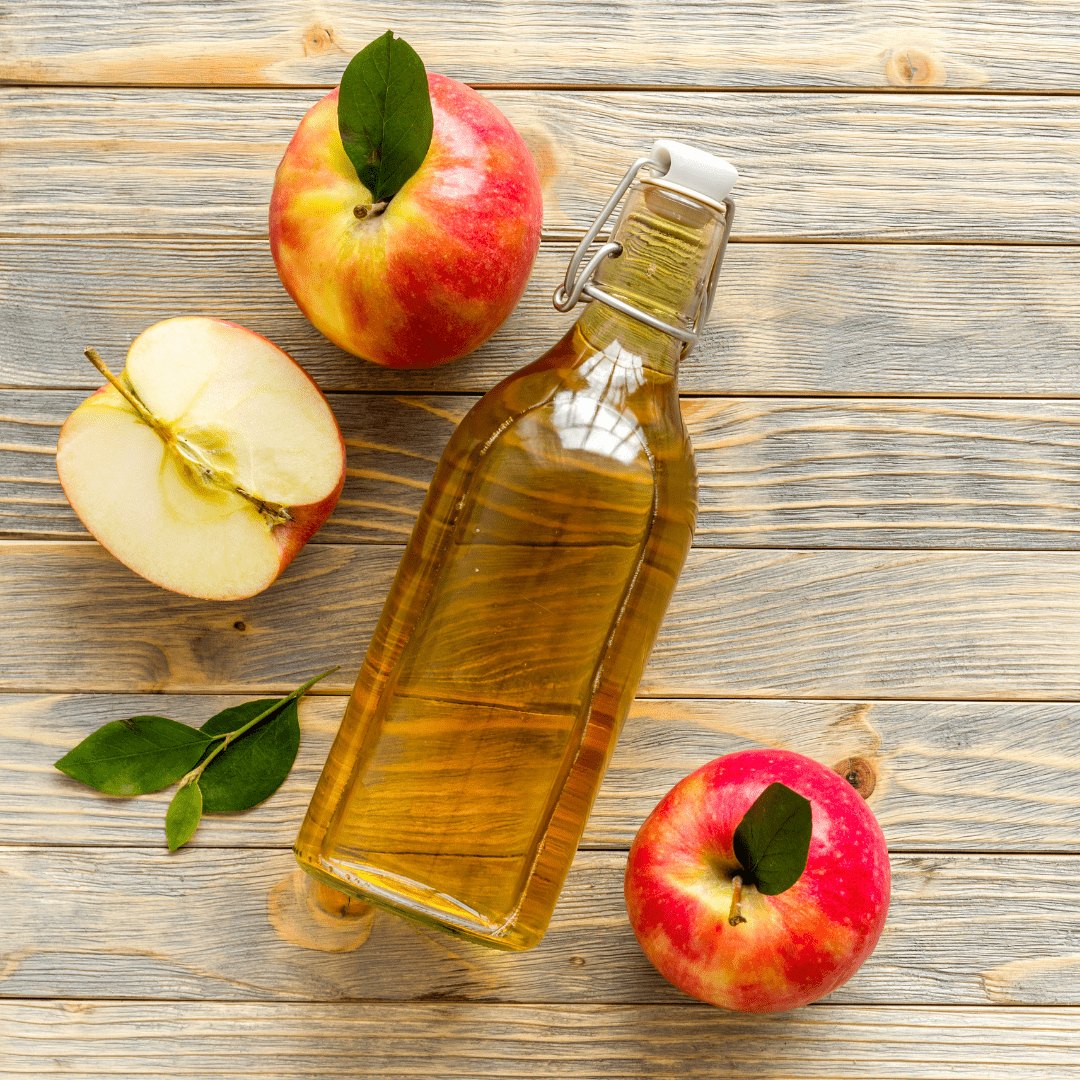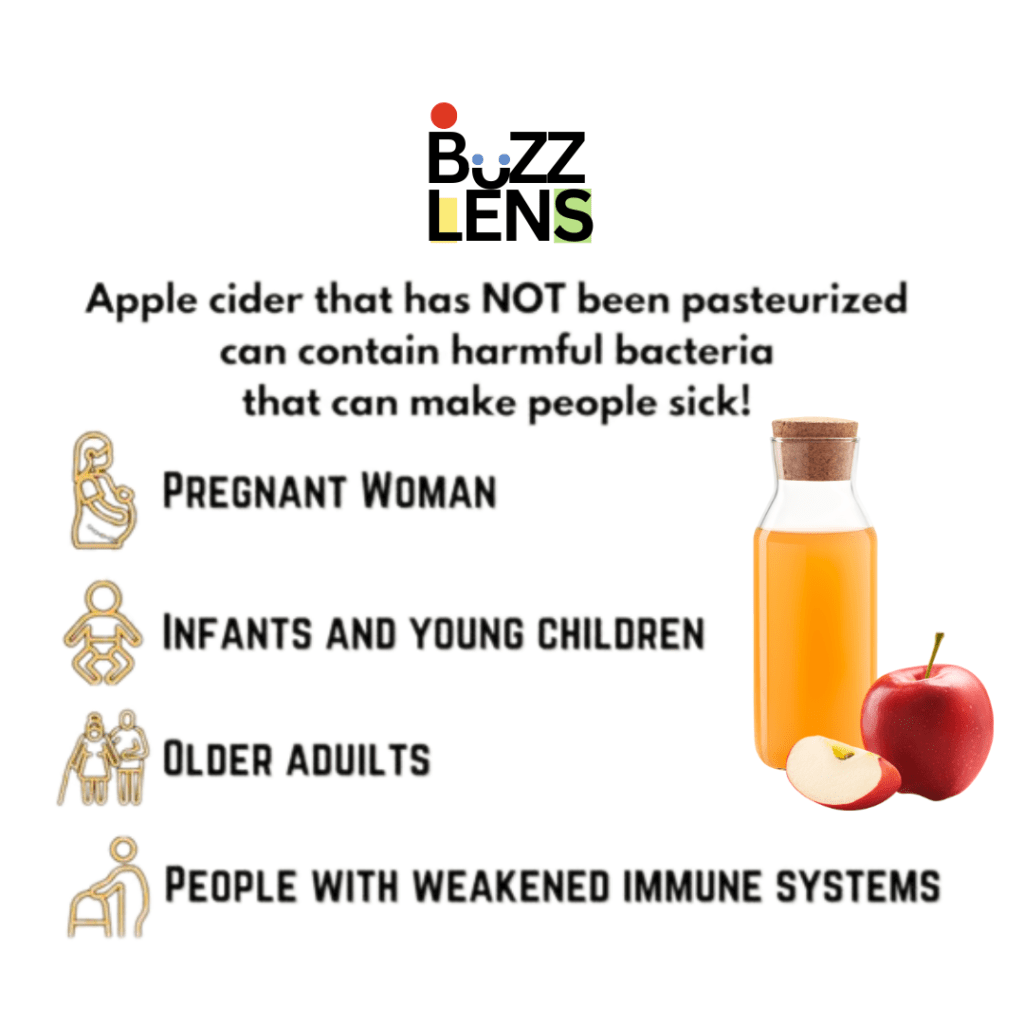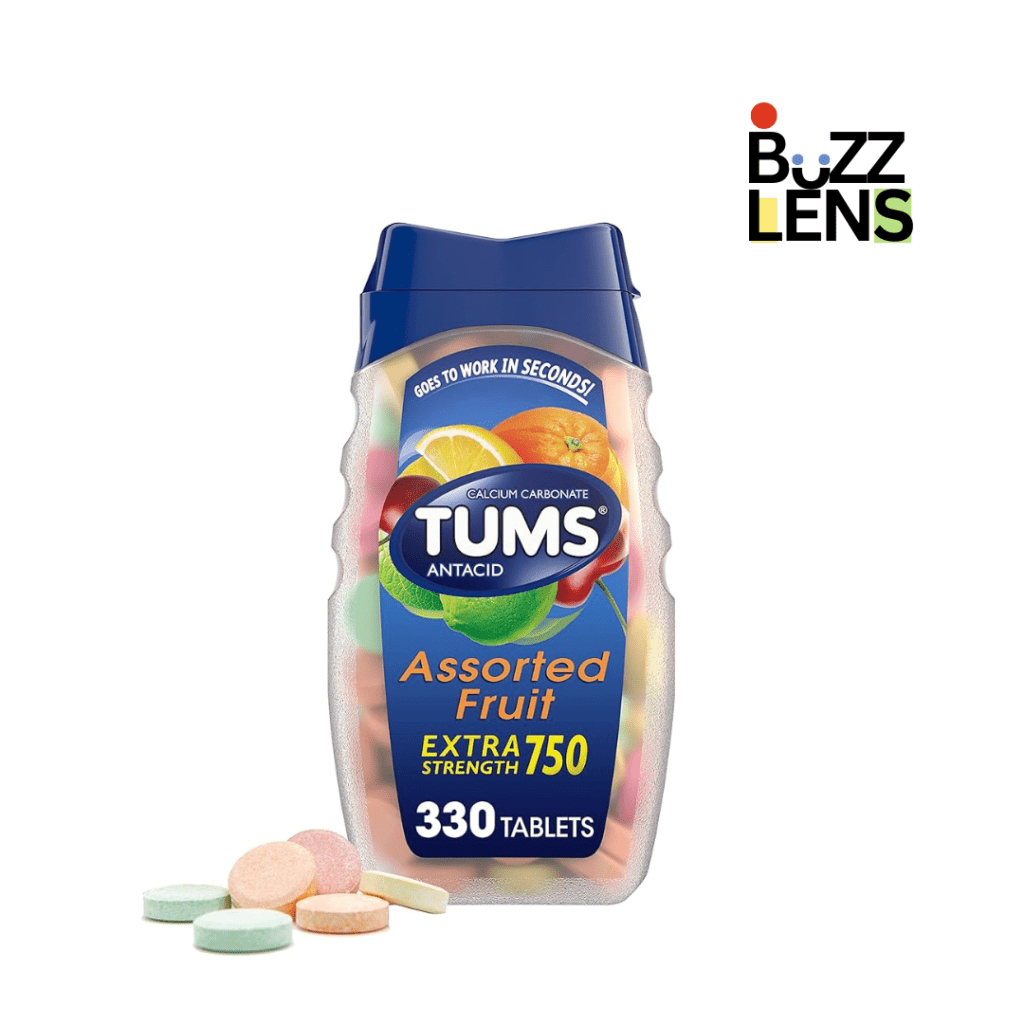Health
Apple Cider Safety Warning: What You Need to Know
Published
1 year agoon
By
Wilson Mark
Unpasteurized apple cider, though a popular fall treat, can pose serious health risks, especially for vulnerable populations such as children, pregnant women, older adults, and those with weakened immune systems.
Apple Cider – A Fall Favorite with Hidden Dangers
As the leaves begin to change and fall activities like apple picking become more popular, many people look forward to enjoying the seasonal treat of apple cider.
Whether hot or cold, this autumnal drink is a beloved staple. However, health officials are urging consumers to exercise caution when drinking unpasteurized apple cider, which can carry harmful bacteria that cause serious illness.
What is Unpasteurized Apple Cider?
Unpasteurized apple cider is a fresh, untreated juice made from apples. Unlike its pasteurized counterpart, unpasteurized cider has not been heat-treated to kill harmful bacteria.

While its raw, unfiltered nature may appeal to those seeking a more natural product, it also poses health risks.
According to the U.S. Food and Drug Administration (FDA), unpasteurized cider is more likely to contain harmful bacteria like E. coli, Salmonella, and Listeria, which can lead to foodborne illnesses.
Also Read: Boar’s Head Deli Meat Outbreak: Expect More Listeria Cases, Warns Food Safety Attorney
Health Risks of Unpasteurized Cider
The risks associated with consuming unpasteurized apple cider are especially concerning for certain populations.

The following groups are more susceptible to serious illness or even death from ingesting harmful bacteria in untreated cider:
- Children: Developing immune systems in children are more vulnerable to foodborne pathogens.
- Older Adults: As people age, their immune systems weaken, making it harder for the body to fight infections.
- Pregnant Women: Illness from contaminated food can affect both the mother and the unborn child, potentially leading to severe complications.
- People with Weakened Immune Systems: Individuals with compromised immune systems, such as those undergoing cancer treatments or living with chronic illnesses, are at higher risk for severe complications from foodborne bacteria.
Also Read: How Your Blood Type Affects Your Health: Understanding the Links
FDA Warnings and Consumer Precautions
The FDA has long been concerned about the dangers of unpasteurized juices and ciders. According to their guidelines, pasteurization is a critical step in ensuring the safety of fruit juices by eliminating harmful microorganisms.
However, many apple orchards and local farmers’ markets continue to sell unpasteurized cider, which can be more flavorful but carries significant risks.
To ensure your family’s safety when purchasing apple cider, the FDA recommends the following precautions:
- Look for the Warning Label: All unpasteurized juice products should have a label that reads: “WARNING: This product has not been pasteurized and therefore may contain harmful bacteria that can cause serious illness in children, the elderly, and persons with weakened immune systems.”
- Ask if Unsure: If you’re buying apple cider from a local orchard, farmers’ market, or roadside stand, it’s essential to ask whether the cider has been pasteurized. Not all establishments are required to label their products, especially if they sell cider by the glass.
- Refrigeration is Key: Unpasteurized cider should always be refrigerated, as keeping it at cold temperatures helps slow the growth of harmful bacteria.
- Boil the Cider: For an extra layer of safety, consumers can heat unpasteurized cider to a rolling boil to kill any bacteria present. This simple step can help reduce the risk of contamination.
Foodborne Illness from Unpasteurized Cider
In past cases, outbreaks of foodborne illness linked to unpasteurized cider have prompted health advisories.

Illnesses from bacteria like E. coli can cause a range of symptoms, including nausea, vomiting, diarrhea, and abdominal cramping.
In more severe cases, these infections can lead to hospitalization, long-term health problems, or even death.
Also Read: First Human Bird Flu Case Without Animal Exposure Confirmed in the US: What You Need to Know
State Health Advisories: A Growing Concern
In recent years, various health departments, including the Ogle County Health Department in Illinois, have issued seasonal advisories warning about the risks of consuming unpasteurized apple cider.
These advisories are not limited to one region, as farmers’ markets and orchards across the United States often sell unpasteurized cider during the fall.
The concern is heightened because unpasteurized cider is often sold as a fresh, “local” product, appealing to consumers seeking an authentic, farm-to-table experience.
Unfortunately, the lack of pasteurization means the juice can harbor bacteria picked up during the apple picking, pressing, or bottling processes.
Balancing Flavor and Safety: Pasteurized vs. Unpasteurized Cider
For many consumers, the appeal of unpasteurized apple cider lies in its fresh, raw flavor. Pasteurization, while making cider safer, can alter the taste slightly by removing some of the natural enzymes and bacteria that contribute to its unique taste profile.

For those who want to enjoy cider without worrying about potential risks, purchasing pasteurized cider is the safest option.
Some companies also use non-heat methods, like high-pressure processing (HPP), to kill harmful bacteria while preserving more of the cider’s original flavor.
The Future of Apple Cider Safety
As awareness grows about the potential dangers of unpasteurized cider, more consumers are becoming vigilant about ensuring the products they buy are safe.
Health officials continue to encourage individuals to prioritize safety, especially when purchasing cider from small, local vendors.
While unpasteurized cider may seem more authentic, the risks often outweigh the benefits, especially for vulnerable groups.
The FDA and local health departments will likely continue to push for clearer labeling and increased education about the risks associated with unpasteurized juices and ciders.
Stay Safe While Enjoying Fall’s Favorite Drink
Apple cider is undoubtedly a beloved fall tradition, but consumers must be aware of the risks that come with unpasteurized versions of this drink.
By taking precautions like checking for warning labels, asking vendors about pasteurization, and boiling the cider at home, you can enjoy this fall treat without compromising your health.
This season, make sure you prioritize safety while sipping on your favorite autumn beverage.
You may like
Health
Level up casino reviews Australia edition
Published
7 months agoon
July 22, 2025By
Wilson MarkLevel up casino reviews Australia edition
In this blunt review, we break down everything you should know about level up casino reviews for Australian players. Find out what matters, which platforms to consider, and pitfalls to avoid. If you’re thinking about joining or comparing online casinos, this is your guide. Get facts, not hype.
Popular Australian Casinos at a Glance
Pokies Madness: Grab 250% Up to $400 & 100 FS
Casino in Your Pocket: 110% Up to $100 & 120 Spins
Pokies Paradise: 200% Up to $2,000 + 150 Free Spins
Start Winning: 300% Bonus Up to $1000 & 75 Spins
Pay with PayID: 50% Match to $400 & 200 Free Spins
Go Big: 175% Welcome Up to $150 & 75 Spins
30% Cashback Every Week – Up to $100 Back
Jump In: 120% Bonus Up to $250 & 40 Free Spins
Aussie Players Welcome: 50% Up to $250 + 60 FS
Welcome Gift: 150% Match Up to $400 + 200 FS Included
Free Play: $100 Bonus + 15 Spins Without a Deposit
Get Started: 300% Bonus Up to $2500 + 150 Free Rounds
Intro Offer: 80% Bonus Up to $400 & 60 Free Spins
Stack the Deck: 300% Match Up to $100 & 75 Spins
Welcome Gift: 150% Match Up to $400 + 200 FS Included
Unlock 20 Free Spins on Your First Deposit
Blackjack Bonus: 80% Up to $750 on Your First Deposit
VIP Lounge Access: 175% Up to $1000 + 100 FS
Midweek Reload: 30% Bonus Up to $300 & 250 FS
High Roller Special: 175% to $3000 + 25 Free Spins
Best slot games on level up casino reviews
Online pokies and slots offer fast, exciting gameplay with instant outcomes and the possibility of sizable rewards. Below, you’ll find a curated selection of the hottest online pokies and slots trending among Australian players. Try your luck or explore new titles directly from home.
Top Online Casino Services and Games
Licensed Australian casinos deliver diverse services, from real money pokies and live-dealer games to poker tables, blackjack, and original skill-based experiences. Level up casino reviews cover which providers offer the best mix. Choose based on your preferences for big wins, variety, or strategy.
Popular Australian Casinos at a Glance
- LevelUp Casino
- Punt Casino
- National Casino
- Casino Rocket
- Fair Go Casino
- Joo Casino
- King Johnnie Casino
Top Online Casino Services and Games
- Online poker rooms
- Real money pokies
- Progressive jackpots
- Live dealer tables
- Blackjack tournaments
- Roulette games
- Baccarat and more
Best Slots and Pokies You Can Play
- Wolf Gold
- Big Bass Bonanza
- Buffalo King
- Gates of Olympus
- Starburst
- Temple Tumble
- Sweet Bonanza
- Book of Dead
- Money Train 2
- Aztec Magic
How Deposits and Withdrawals Work
Australian casino sites make depositing simple with debit cards, e-wallets, and crypto options. Withdrawals usually take from several hours up to five days, with verification needed for first-time requests. Daily and weekly withdrawal limits apply. Review each casino’s financial terms before signing up.
| Payment Method | Deposit Time | Withdrawal Speed |
|---|---|---|
| Visa/MasterCard | Instant | 1-3 days |
| Neosurf | Instant | N/A |
| Bitcoin | Instant | Within 1 day |
| Skrill | Instant | 1-2 days |
Mobile Casino Experience in Australia
Most Aussie online casinos offer sleek mobile sites or dedicated apps for Android and iOS. Features include mobile-only bonuses, quick game loading, and fast deposits. All major pokies and live games work on smartphones and tablets.
Bonuses and Promotions
Welcome packages, no deposit spins, and reload bonuses boost your bankroll. Wagering requirements typically range from 20x to 50x. Always check bonus expiry and eligible games. VIP rewards systems offer cashback, fast payouts, and event tickets for regulars.
Security and Fair Play Ensured
Look for gambling operators licensed by international authorities. All games should use RNG technology for fairness. SSL encryption protects your data. Independent audits are a positive sign. Customer funds should stay segregated from operations accounts.
Customer Support and Player Care
Quality live chat is now standard. Hotlines and email support offer extra layers. Expect a response within minutes during Aussie business hours and detailed FAQ sections for self-help. Multilingual staff are available at leading casino brands.
Responsible Gambling Tools & Advice
Responsible gaming tools include personal deposit caps, self-exclusion, and time trackers. Accredited sites promote responsible gambling organisations. Early signs of unsafe behaviour trigger notifications or account limitations. Seek help if you feel your play is out of control.
Reading the Fine Print: Terms & Conditions
Always read the small print regarding playthroughs, max withdrawal limits, and restricted games. Terms may be updated frequently. Some casinos restrict bonus play for certain games or regions. Careful reading avoids misunderstandings and disappointment.
FAQ – level up casino reviews in Australia
What is level up casino reviews?
Level up casino reviews are independent opinions, overviews, and ratings of major online casinos available in Australia, focusing on features, reliability and user experience.
Are online casinos safe for Australians?
Licensed online casinos use security protocols and fair play policies, but always check for proper regulation before playing.
Can I win real money at Australian online casinos?
Yes, you can win and withdraw real AUD winnings if you play at certified Australian-friendly sites.
Which payment methods can I use?
Common methods include Visa, MasterCard, Neosurf, cryptocurrency, bank transfer, and popular e-wallets.
What are typical bonus wagering requirements?
Most sites ask for wagering your deposit and bonus 20-50 times before withdrawal.
Is there a best time to play online pokies?
No specific time guarantees better odds, as pokies use random number generation for each spin.
Best Online Casinos in Australia 2024
Australia’s iGaming landscape is thriving with fresh brands, innovative games and player-first bonuses, making it a great time to explore top casino sites. Whether you’re into pokies, live tables or sports betting action, the following brands are popular choices among Aussie punters. Get to know which ones stand out and why.
Aussie Play Casino Experience
Aussie Play is well known for its laid-back style and huge pokies library. Players in Australia can expect a very generous welcome bonus, easy registration and local-friendly banking options. Their mobile site works fluently on even basic phones. Customer service is on hand 24/7 via live chat.
Bizzo Casino in the Australian Market
Bizzo has quickly become a favourite due to its fast payments and over 3,000 pokies from top software providers. Aussie players can use AUD for deposits and withdrawals, and weekly free spins offers help keep the excitement high. Their tournaments are a must-try for slot fans.
Caesars Casino Down Under
Caesars, an international casino giant, also accepts Australian players with a sophisticated selection of games. From classic table games to immersive live dealer experiences, it brings a slice of Las Vegas straight to your home. Advanced encryption ensures safe and private gameplay.
Casino Swish for Pokies Fans
Casino Swish makes a mark with its slick interface and huge selection of Aussie-themed pokies. Players can join loyalty programs and claim reload bonuses tailored to regular players. Its payment process is streamlined for local convenience and quick payouts.
Casinonic: Trusted Option for Australians
Australians frequently recommend Casinonic for its speedy withdrawals, secure transactions, and quality games from Pragmatic Play, Microgaming and more. Promotions are frequent and the supporting team is responsive, ensuring an easy experience for new players.
Gets Bet: Sports Betting and More
Gets Bet wraps casino, live casino and sports betting in a single platform, ideal for Aussies who like to combine pokies and wagering. Real-time odds and a seamless mobile app attract sports enthusiasts across the country.
Golden Tiger Casino’s Reputation
Golden Tiger stands out with its big progressive jackpots, frequent bonuses and a reliable Aussie support team. Its desktop and mobile sites both run smoothly, making it a long-standing favourite for Australian casino fans.
High Roller Action
If you like higher stakes, High Roller is tailored for VIP play. Its lavish perks, cashbacks and high deposit limits attract serious punters. Withdrawal times are among the fastest in the segment.
Other Noteworthy Australian Casino Sites
The following brands also have a loyal following in Australia:
- Interwetten brings strong betting options and casino games with fast pay-outs.
- Merkur features top pokies and unique branded games with easy navigation.
- Planet7Casino is famous for on-the-spot cash bonuses and round-the-clock assistance.
-
Poker Star delivers robust poker tournaments and interactive table experiences.
- Royal Ace offers both pokies and table games; attractive for both casual and experienced players.
- SlotJoint gives hundreds of pokies and flexible payment solutions for locals.
- SlottyWay is popular for its exciting slot tournaments and weekly reload bonuses.
- Sportingbet merges betting with casino action, supporting a great range of Aussie sports and slots.
- ThePokies features a local-first approach with loads of Australiana slots.
Uptown Aces and WildCardCity
Uptown Aces focuses on generous welcome bonuses, secure payment options and unique slot themes. WildCardCity is all about urban glamour with VIP privilege schemes and handy support, ensuring top rates of player satisfaction.
WynnBet
WynnBet is gaining pace with mobile-first design and exciting promotions. Its tailored sports and casino offers appeal to players who demand both action and safety.
Responsible Gambling for Australians
Before you start spinning reels or placing wagers, remember to play responsibly. Australia has support services such as Gambling Help Online and phone helplines to provide confidential advice and help you keep gaming fun and safe. Play only with money you can afford and set limits for your entertainment.
Reference only. 18+ / 21+ where applicable
level up casino reviews
Health
Why Do People on Obesity Medications Drink Less Alcohol? Here’s What We Know
Published
1 year agoon
December 14, 2024By
Wilson Mark
Some people who take anti-obesity medications drink less alcohol. Scientists are trying to figure out why this happens.
How Anti-Obesity Drugs Impact Alcohol Use
Anti-obesity medications, such as Wegovy and Ozempic, may lower alcohol consumption. These drugs, called GLP-1 receptor agonists, are usually prescribed to help with weight loss and type 2 diabetes. However, new research shows they might also reduce drinking habits.
A recent study found that 45% of people on these drugs drank less alcohol. The study, published in JAMA Network Open, involved over 14,000 participants. Researchers believe this connection could lead to more discoveries about these medications.
Key Findings
Here’s what the study revealed:
- Participants: Over 14,000 individuals taking anti-obesity medications.
- Results: 45% of drinkers reduced their alcohol intake.
- Drugs Used: Medications included semaglutide, tirzepatide, and liraglutide.
- Who Benefited Most: Heavy drinkers and people with severe obesity saw the biggest change.
While most participants saw no change, only 2% drank more alcohol.
Why Do These Drugs Affect Alcohol?
The exact reason remains unclear.

However, experts have a few ideas:
- Impact on the Brain: These drugs may reduce cravings by changing how the brain processes rewards. This could lower the desire for alcohol.
- Lifestyle Changes: Many people make healthier choices while on these medications, such as eating better or drinking less.
- Lower Tolerance: Weight loss reduces alcohol tolerance, which might lead people to drink less.
More research is needed to confirm these theories.
Can These Drugs Treat Addiction?
Some experts are hopeful these drugs could help with addiction in the future. However, they are not currently approved for this use.
Dr. Timothy Brennan from Mount Sinai said, “These findings are exciting, but we need more studies to understand their effects on alcohol use.”
Researchers believe these drugs have potential, but it’s too early to draw conclusions.
Should You Avoid Alcohol While Taking These Medications?
You don’t have to stop drinking completely, but experts suggest being cautious.

Here’s why:
- Side Effects: Alcohol may worsen nausea or low blood sugar, which are common side effects of these drugs.
- Calories: Alcohol contains a lot of calories, which could slow your weight-loss progress.
- Health Benefits: Reducing alcohol may improve overall health and make the medication more effective.
If you’re starting a new medication, it’s a good time to evaluate your drinking habits.
What Should You Do?
If you’re prescribed medications like Wegovy or Ozempic, consider these tips:
- Notice if your cravings for alcohol change.
- Take this chance to build healthier habits.
- Talk to your doctor if you have concerns about drinking or other side effects.
What’s Next?
The link between anti-obesity medications and reduced drinking is fascinating. Scientists need more studies to understand how these drugs work.
For now, they remain a powerful option for weight management. The added benefit of possibly reducing alcohol consumption is an exciting bonus.
Health
How to Get Rid of Sulfur Burps: Effective Remedies and Prevention Tips
Published
1 year agoon
November 5, 2024By
Wilson Mark
Sulfur burps may be alleviated by changes in diet, proper water intake, and the use of pharmacy drugs, but it is crucial to know what causes them.
Sulfur Burps
Sulfur burps are bad-odour burps that smell like rotten eggs; many people experience this.
They can be painful and awkward and are sometimes coupled with other abdominal symptoms, including bloating, stomach-churning, or diarrhoea. The foul smell associated with sulfur burps emanates from hydrogen sulfide (H2S) generated inside your stomach.
To know how to treat and get rid of sulfur burps, it is essential to understand the causes that contribute to it.
This article will look at possible causes of sulfur burps, options for natural cure remedies, medical treatment, and ways of avoiding them.
What Causes Sulfur Burps?
Sulfur burps occur when hydrogen sulfide gas builds up in the stomach and is released through burping.

Various factors can contribute to the production of this gas, but here are the most common causes:
- Dietary Choices
Certain foods high in sulfur content can contribute to the production of sulfur gas. Some of these foods include:- Eggs
- Meat (especially red meat)
- Cruciferous vegetables like broccoli, cabbage, and cauliflower
- Garlic and onions
- Dairy products
- Beans and legumes
- Gastrointestinal Infections
Some infections, particularly those caused by bacteria like Helicobacter pylori or parasites like Giardia, can lead to sulfur burps. These infections can disrupt your digestive system, leading to excess gas production. - Indigestion or GERD (Gastroesophageal Reflux Disease)
Indigestion or GERD can slow digestion, allowing food to sit in the stomach longer and produce more gas. This gas can sometimes have a sulfurous smell, leading to sulfur burps. - Food Intolerances
Lactose intolerance, gluten sensitivity, or other food intolerances can cause incomplete digestion of food, leading to gas buildup and sulfur burps. - Medications
Some medications, particularly those containing sulfur compounds or antibiotics that affect the balance of gut bacteria, can contribute to sulfur burps.
Natural Remedies to Get Rid of Sulfur Burps
Although passing sulfur burps might be embarrassing, in most cases, they can be cured naturally. Below, I give you some home remedies that may help if you decide to try:
1. Stay Hydrated

Proper digestion requires that one drink enough water, which is determined by the intensity of the exercises. Drinking fluids eliminates accumulated toxins, thus ensuring the digestive system is working properly, and there is less likelihood of developing gas. Avoid sulfur burps by taking at least eight glasses of water per day.
2. Green Tea or Herbal Teas

Green tea, mint, or chamomile will also relax your tummy and reduce gas formation. Green tea, in particular, has antioxidants that can help with digestion, while peppermint helps to relax the gut.
3. Eat Smaller, More Frequent Meals

Eating large meals or taking more than necessary also puts pressure on the digestive system, resulting in information of gases, including sulfur. Dividing the portions into smaller meals that are taken frequently ensures that the body can break down the food into Sulphur without experiencing sulfur burps.
4. Avoid Sulfur-Rich Foods
If you experience sulfur burps often, you should reduce the intake of sulfur-containing foods such as eggs, broccoli, garlic, and dairy products. These foods may cause more gas production; therefore, cutting down or eliminating these foods from the diet may greatly help.
5. Try Apple Cider Vinegar

Apple cider vinegar (ACV) is one of the go-to home remedies for enhancing digestion. ACV has an impact on balancing the level of acidity in the stomach, hence facilitating the digestion of foods and decreasing the formation of sulfur gas. Ingest a glass of water mixed with 1 tablespoon of ACV, and see if it is taken before meals.
6. Use Probiotics
Probiotics are beneficial bacteria that promote healthy digestion by balancing the gut’s bacterial environment. Taking a probiotic supplement or eating probiotic-rich foods like yogurt, kefir, or sauerkraut can help prevent sulfur burps by keeping your digestive system balanced.
Over-the-Counter Remedies for Sulfur Burps
Several over-the-counter treatments are available if natural remedies aren’t enough to resolve your sulfur burps.
1. Antacids

Many recipes warn about foods that produce gas, but antacids can help neutralize stomach acid and leave your digestive system to do the work. This may be useful, especially if the sulfur burps originate from indigestion or GERD.
Table: Best OTC Medications for Sulfur Burps
| Medication Type | How It Helps | Example Products |
|---|---|---|
| Antacids | Neutralize stomach acid | Tums, Rolaids |
| Simethicone | Breaks up gas bubbles in the stomach | Gas-X, Mylanta Gas |
| Probiotics | Supports gut health | Culturelle, Align, Florastor |
2. Simethicone
It is an anti-gas drug that alters the sizes and distribution of gas in the stomach and intestines, promoting gas release without the smell.

Simethicone-containing products such as Gas-X or Mylanta Gas quickly relieve such pain.
3. Activated Charcoal
Charcoal is effective in absorbing gases and toxins in your stomach. The common formulation is a pill that can successfully minimize normal gas and sulfur-related burps.
Always check with your doctor before using charcoal supplements, as they may interfere with medications.
When to See a Doctor for Sulfur Burps
While sulfur burps are often harmless, they can sometimes signal an underlying health issue that requires medical attention.
If your sulfur burps are persistent or accompanied by other symptoms, such as severe abdominal pain, diarrhoea, nausea, or vomiting, it’s time to consult a doctor.
Here are a few conditions that may require medical evaluation:
1. Gastrointestinal Infections
As mentioned earlier, infections like H. pylori or Giardia can cause sulfur burps and other symptoms like bloating, nausea, diarrhoea, and stomach cramps. Testing for these conditions often involves stool, blood, or breath tests.
2. GERD or Chronic Indigestion
GERD or chronic indigestion can lead to frequent sulfur burps due to slowed digestion. If you experience heartburn, regurgitation, or pain after eating, consult a healthcare provider for proper diagnosis and treatment.
3. Food Intolerances or Sensitivities
Food intolerances, such as lactose intolerance or celiac disease, may cause sulfur burps. Your doctor may recommend elimination diets or tests to identify specific food triggers.
Prevention Tips: How to Stop Sulfur Burps from Coming Back
Once you’ve gotten rid of sulfur burps, preventing them from returning is essential. Here are some long-term strategies you can follow:
1. Monitor Your Diet
Pay attention to how certain foods affect your digestive system. Keeping a food diary can help you identify which foods trigger your sulfur burps so that you can adjust your diet accordingly.
2. Eat Slowly and Chew Thoroughly
Eating too quickly can cause you to swallow air, leading to gas and burping. Chewing food thoroughly helps your digestive system break down food more efficiently, reducing the chance of sulfur gas forming.
3. Avoid Carbonated Beverages
Carbonated drinks like soda and sparkling water introduce extra air into your stomach, which can lead to burping. Try to cut down on these beverages to reduce gas and sulfur burps.
4. Exercise Regularly
Regular physical activity can improve digestion by keeping things moving through your gastrointestinal tract. Even light activities like walking after a meal can help prevent gas buildup.
5. Stay Hydrated
Hydration is vital to maintaining healthy digestion. Water helps break down food and keeps things moving through your digestive system, reducing the likelihood of gas formation.
Banish Sulfur Burps for Good
Sulfur burps may be unpleasant, but they’re usually treatable with dietary changes, natural remedies, and over-the-counter medications.
Whether you’re dealing with a one-time issue or chronic sulfur burps, identifying the underlying cause is the first step toward relief.
By adjusting your diet, staying hydrated, and trying some of the remedies outlined here, you can eliminate sulfur burps and prevent them from returning.
Remember, if sulfur burps persist or are accompanied by other severe symptoms, it’s essential to consult a healthcare provider to rule out any underlying health issues.


iOS 26 Explained: Stability & The Future of iPhones
Level up casino reviews Australia edition
Magnitude 5.1 Earthquake Rattles Northern Iran — No Major Damage Reported
Trending
-

 FASHION9 years ago
FASHION9 years agoThese ’90s fashion trends are making a comeback in 2017
-

 Entertainment9 years ago
Entertainment9 years agoThe final 6 ‘Game of Thrones’ episodes might feel like a full season
-

 FASHION9 years ago
FASHION9 years agoAccording to Dior Couture, this taboo fashion accessory is back
-

 Entertainment9 years ago
Entertainment9 years agoDisney’s live-action Aladdin finally finds its stars
-

 Sports9 years ago
Sports9 years agoBoxing continues to knock itself out with bewildering, incorrect decisions
-

 Entertainment9 years ago
Entertainment9 years agoThe old and New Edition cast comes together to perform
-

 Sports9 years ago
Sports9 years agoPhillies’ Aaron Altherr makes mind-boggling barehanded play
-

 Sports9 years ago
Sports9 years agoSteph Curry finally got the contract he deserves from the Warriors




